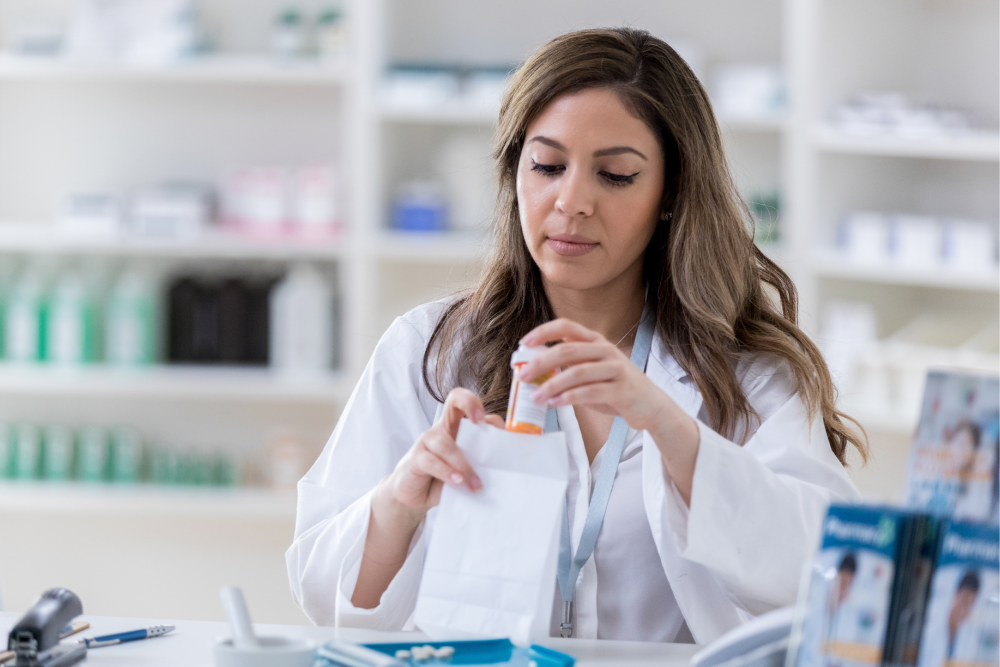In the dynamic healthcare landscape, one term gaining increasing prominence is “compounding pharmacy.” As traditional medicine continues to evolve, compounding pharmacies are emerging as essential players, offering a personalised approach to medication that goes beyond the one-size-fits-all model of mass-produced drugs.
But what is a compounding pharmacy, and how does it differ from your typical pharmacy? To unravel this aspect of modern healthcare, we delve into the world of compounding pharmacies, exploring the art and science behind personalised medications designed to meet the unique needs of individual patients.
We journey through the fundamentals of compounding pharmacies, examining their role in addressing specific health challenges and providing a closer look at the advantages they bring to patients and healthcare providers alike. From understanding the compounding process to exploring the question on everybody’s minds, “Where is the nearest compounding pharmacy near me?”
What is the Difference Between a Pharmacy and a Compounding Pharmacy?
A pharmacy and a compounding pharmacy both play key roles in the healthcare ecosystem, but their scope and services differ. Here’s an overview of the key differences between the two:
Traditional Pharmacy
Dispensing Standard Medications: Traditional pharmacies primarily dispense commercially available, mass-produced medications in standardised forms and dosages.
Retail Services: These pharmacies, often found in retail settings, focus on providing a broad range of medications and over-the-counter products to meet general healthcare needs.
Pre-Packaged Medications: Medications in traditional pharmacies are pre-packaged by pharmaceutical manufacturers and follow standardised formulations.
Compounding Pharmacy
Customised Medications: Compounding pharmacies specialise in preparing personalised medications tailored to meet the unique needs of individual patients. This includes adjusting the dosage, changing the form of the medication (e.g., liquid instead of a pill), or combining multiple medications into a single dosage.
Patient-Specific Formulations: Compounding pharmacists work closely with healthcare providers and patients to create medications that are not available commercially or to address specific issues such as allergies or sensitivities to certain ingredients.
Diverse Dosage Forms: Compounding pharmacies offer a variety of dosage forms, including creams, gels, capsules, tablets, and more, providing flexibility for patients who may have difficulty with standard medication forms.
Medication Shortages: Compounding pharmacies play a vital role in addressing medication shortages by formulating customised solutions using the active ingredients from brand-name equivalents. This is particularly beneficial for weight loss injections, as compounding pharmacies can provide tailored formulations in accordance with regulations set by the Therapeutic Goods Administration (TGA).
In summary, while traditional pharmacies focus on dispensing commercially available medications, compounding pharmacies specialise in preparing personalised medications tailored to individual patient requirements. The latter offers a more flexible and patient-centric approach to medication, addressing unique health challenges that may not be met by standard pharmaceutical options and during times of national shortage.

How Does A Compounding Pharmacy Work?
In Australia, compounding pharmacies operate within the framework of specific regulations and guidelines set by regulatory authorities to ensure the safety, quality, and efficacy of compounded medications. Here’s an overview of how compounding pharmacies work in Australia:
Regulatory Oversight
Therapeutic Goods Administration (TGA): The TGA is Australia’s regulatory body for therapeutic goods, including medications. Compounded medicines fall under the jurisdiction of the TGA, and compounding pharmacies must comply with the applicable regulations.
Compounding Process
Prescription Requirement: Compounded medications in Australia require a prescription from a registered healthcare practitioner, such as a doctor or nurse practitioner. The prescription outlines the specific requirements for the compounded medication, including dosage, form, and any necessary customisation.
Compounding Pharmacists: Compounding pharmacies have pharmacists with specialised training in compounding techniques. These pharmacists work closely with healthcare providers to understand the patient’s unique needs and ensure the precise formulation of the medication.
Quality and Safety Standards
Good Manufacturing Practice (GMP): Compounding pharmacies in Australia adhere to GMP standards to ensure the quality, safety, and consistency of compounded medications. GMP guidelines set by the TGA focus on maintaining rigorous processes throughout the compounding workflow.
Quality Ingredients: Compounding pharmacies use pharmaceutical-grade ingredients sourced from reputable suppliers to maintain high standards of quality in compounded medications.
Customisation and Flexibility
Tailored Formulations: Compounding pharmacies offer a range of dosage forms to accommodate patient preferences and needs, such as creams, gels, capsules, and more.
Allergen-Free Options: Compounding pharmacies can formulate medications without certain allergens or additives, addressing specific sensitivities or intolerances that patients may have.
Compliance with TGA Guidelines
TGA-Approved Ingredients: Compounded medications use ingredients approved by the TGA or compliant with the TGA’s guidelines. This ensures that the compounded medications meet the necessary safety and quality standards.
Record Keeping
Documentation: Compounding pharmacies maintain detailed records of each compounded medication, including the ingredients used, compounding process, and relevant quality control measures. This documentation is crucial for traceability and quality assurance.
Patient Counselling
Pharmacist-Patient Interaction: Compounding pharmacists counsel patients regarding the proper use, storage, and potential side effects of compounded medications. This ensures that patients are well-informed and can use the medications safely and effectively.
Compounding pharmacies in Australia operate under strict regulatory oversight to provide customised medications that meet the specific needs of individual patients. The process involves collaboration between healthcare providers and compounding pharmacists, adherence to regulatory standards, and a commitment to ensuring the safety and efficacy of compounded medications.

Why Do Patients Need to Go to a Compounding Pharmacy?
Patients often turn to compounding pharmacies when faced with medication shortages, a situation that may arise due to manufacturing issues, discontinuation of certain drugs, or unexpected increases in demand.
In Australia, the Therapeutic Goods Administration (TGA) plays a pivotal role in addressing these challenges by permitting compounding pharmacies to create tailored medications during shortages. The TGA recognises the vital role compounding pharmacies play in ensuring patient access to essential treatments. By allowing compounding under specific circumstances, such as shortages, the TGA ensures patients receive the medications they need, even when conventional pharmaceutical supplies are limited.
This flexibility not only underscores the adaptability of compounding pharmacies but also highlights the regulatory responsiveness of the TGA to safeguard public health during challenging situations, ensuring that patients can continue to receive necessary and personalised healthcare solutions.
What Is an Example of a Compound Drug?
Since the TGA prevents us from mentioning specific brand names and medications, let’s look at a similar scenario:
Imagine a chef crafting a unique meal tailored to your specific dietary preferences – a meal not on the standard menu. Similarly, a compounded medication is like a bespoke prescription formulated by a compounding pharmacist. It’s a personalised blend of carefully measured and combined pharmaceutical ingredients to address your health needs. Just as a chef adjusts ingredients to suit your palate, compounding pharmacies can modify medication dosage, change its form, or eliminate allergens to create a custom solution not available in mass-produced drugs. This tailored approach allows patients to enjoy the precision of a prescription designed just for them, ensuring optimal effectiveness and compatibility with their unique health requirements.
Can You Trust a Compounding Pharmacy?
Trusting a compounding pharmacy hinges on a balance of stringent regulations, the pharmacist’s expertise, and open communication with healthcare providers. When these elements align, compounding pharmacies can be trusted to deliver personalised medications that meet the highest safety, efficacy, and precision standards. However, it is important for patients to thoroughly research and choose compounding pharmacies with a proven track record of compliance with regulatory guidelines, transparent practices, and a commitment to patient well-being.
Discover Trusted Compounding Services with hub.health
At hub.health, we understand the importance of partnering with reputable healthcare providers. Your Solutions Compounding Pharmacy is a Brisbane compounding pharmacy known for its unwavering commitment to excellence and personalised pharmaceutical solutions.
So, the next time you find yourself wondering, “Where is the nearest compounding pharmacy near me?” trust hub.health and experience the quality care provided by Your Solutions Compounding Pharmacy. Your health is our priority.




